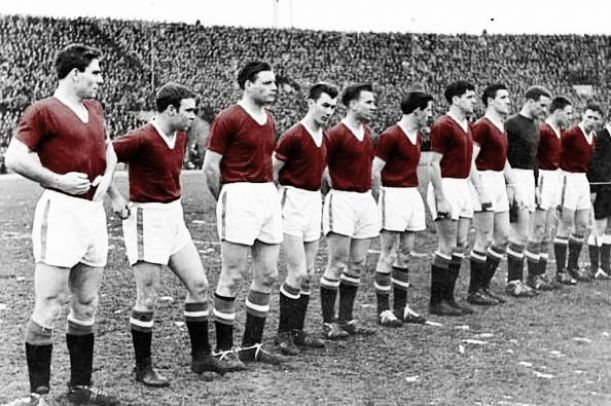23 lives were claimed during the Munich air disaster of 6th February 1958. 11 of those who never returned were from Manchester United, with the club travelling home following a 3-3 draw with Red Star Belgrade. Goals from Bobby Charlton and Dennis Viollet left spirits high as they stopped off in Germany to refuel, but the subsequent turn of events will be remembered forever, alongside those who were lost.
Roger Byrne
The 28-year-old full-back captained the Busby Babes, and died on the day of the crash. Two days before his 29th birthday, the Manchester born-and-bred defender was to receive the news that his wife Joy was expecting their first child upon his return. Byrne featured 277 times for the Reds and scored 19 goals, his only professional club having come through the youth ranks.
"An aristocratic footballer, majestic in his movement. Roger was so fast but at the same time he controlled his movement beautifully, like Nureyev." - Sir Matt Busby
Eddie Colman
The youngest fatality in the Munich air disaster, half-back Eddie Colman was just 21 years and 3 months old at the time of his death. Progressing through the youth ranks at Old Trafford, the youngster had entered his third season with the Reds upon his death. Scoring once in his career, he had featured 24 times in his last season.
“Eddie was a chirpy lad and a terrific player. He pushed the ball – never kicked it – and he jinked past players. He was known for his swivel hips.” – Wilf McGuinness
David Pegg
One-time internationally capped forward David Pegg died early into in his career. The 22-year-old had found the net 28 times in 148 appearances for the Reds, joining the youth team after leaving school. Having made his debut aged 17 in 1952, he was the club’s first-choice outside left until the final few months leading to the disaster. Displaced by Albert Scanlon, he collected two League Championship winner’s medal in his last two full seasons.
"David would have been a great asset to any team because he was a natural left-flank player. David was very, very clever. Our best left-winger by a mile." - Sir Matt Busby
Mark Jones
24-year-old Mark Jones was another to join the club as an apprentice after leaving school, and made his first two appearances in the 1950/51 season. By the time United had found title glory, he was a regular first-team player. Missing the 1957 FA Cup Final through injury, the half-back scored once in 120 appearances while being selected in the England international squad on a single occasion. He didn’t take to the field, but was expected to feature should he have returned from Munich.
"Yorkshireman Mark was a really lovely fellow, but my word he was a tough nut, and nobody took any liberties with him on or off the field." - Bill Foulkes
Tommy Taylor
Scoring a staggering 128 goals in 189 appearances, Tommy Taylor was an irreplaceable figure in the Manchester set-up. Having spent four years at Burnley prior to joining the Reds, he signed in March 1953 for £29,999. Matt Busby didn’t want to burden the youngster with the label of a £30,000 player, so after paying the fee, handed a £1 note to a lady in the Boardroom to cover the remainng fee. Taylor died aged 26, and at the time was engaged to his fiancée Carol.
“I rate him as one of the all-time, best centre-forwards in the game, and he had yet to realise all his potential. He was a typically bluff Yorkshireman in many ways, often acting the clown, and a great team man.” – Bill Foulkes
Duncan Edwards
Duncan Edwards had featured for Manchester United 175 times despite being just 21 years of age, and scored 21 goals as a half-back. Signing for the club as a teenager, he became the youngest player to play in the First Division, before becoming England’s youngest player since the Second World War. Despite his promising career – which saw him labelled as potentially one of the best in the world – he won two league championships and reached the semi-finals of the European Cup in less than five years.
Rushed to the Rechts der Isar Hospital with multiple leg fractures, fractured ribs and severely damaged kidneys, it was expected he would survive, but may never play football again. With an artificial kidney used, his ability for blood to clot was reduced while internal bleeding affected him gretly. He was noted to ask assistant manager Jimmy Murphy, "What time is the kick off against Wolves, Jimmy? I mustn't miss that match", but despite his improving condition, he died in the early hours of 21st February.
"When I used to hear Muhammad Ali proclaim to the world he was the greatest, I used to smile. The greatest of them all was a footballer named Duncan Edwards." - Jimmy Murphy. "The only player who ever made me feel inferior." - Sir Bobby Charlton
Geoff Bent
25-year-old Geoff Bent joined United as an apprentice, and covered for Roger Byrne on the left and Bill Foulkes on the right. Predominantly featuring in the reserve and youth sides, he managed 12 appearances after a wealth of injuries. Bent only travelled to Belgrade to act as cover for Byrne, but with the captain featuring, watched from the sidelines – his last ever game for the Reds. He left wife Marion Mallandaine and their one-year-old daughter Karen.
"When Geoff matured and reached his twenties there were many clubs after him but he stayed loyal. He could look after himself and was a great tackler. Roger Byrne was a consistent player and very brave, that was the reason Geoff got so few games, but he was good enough to hold a regular place in any team." - Jimmy Murphy
Liam ‘Billy’ Whelan
Whelan was another who just 22-years-old at the time of his death, after his father John died in 1943. The forward was not a confident flyer, and was heard to exclaim, "Well, if this is the time, then I’m ready,” prior to take-off. He made 96 appearances in four seasons, managing an impressive 52 goals. He helped the club win their second successive league title and reached the semi-finals of the European Cup and FA Cup prior to his death.
"Billy was a magician with a ball at his feet. I really don't think he knew how good he was and how much better he could have become. A world-class forward. There is no doubt about that. His vision and passing was sheer class." - Albert Scanlon
Walter Crickmer / Tom Curry / Bert Whalley
Three club officials also died in the disaster. Walter Crickmer became club secretary in 1926, and had managed the side twice, from 1931 to 1932 and again from 1937 to 1945. He was responsible for founding the youth development system at the club, and died after 32 years’ service to the club.
Tom Curry retired from playing in 1930, and joined United as a coach after four years with Carlisle United. He had worked with the club for 14 years prior to the crash, in which he was killed instantly.
Bert Whalley, also a former player who managed 32 appearances while hindered by the war, was appointed as first-team coach during Matt Busby’s reign. He was promoted to the role of chief coach as Jimmy Murphy became assistant manager, and also died instantly in the crash.
"Walter Crickmer always reminded me of a little dynamo, nothing was too much trouble. Tom Curry was someone we looked up to like a father. And Bert Whalley was certainly a tremendous help to me when I was a part-timer." - Bill Foulkes










































